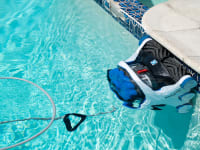 Credit:
Credit:
Products are chosen independently by our editors. Purchases made through our links may earn us a commission.
This past summer wasn't a typical one. People stayed off the beach, with many opting to bring summer fun to their own backyards with a new pool. While pool season hasn't returned yet, when it does, chances are your pool is going to need a thorough cleaning.
Enter the Ariel by Solar-Breeze, a new solar-powered, pool-cleaning robot that's debuting at CES 2021. While many existing pool-cleaning robots focus on sucking up the debris that sinks to the bottom of your pool, the Ariel focuses on the bugs, pollen, and debris floating on the water's surface.
Solar-Breeze claims that the Ariel device can remove up to 95% of detritus before it has the chance to sink to the bottom, which means less bacterial and algae growth, as well as less pool pump runtime.
Here at Reviewed, we've only dipped our toes into the shallow end of the pool cleaner world. Nonetheless, the Ariel intrigues.

While debris that floats on the surface of your pool can be an eyesore, it's less of a risk to your pool's lining than grit that sinks immediately to the bottom.
Not only are we eager to test its claims about reducing pool pump usage by as much as 60%—pumps are expensive to run and maintain—we're also just interested to see if only cleaning the pool's surface stands up.
While leaves and dead bugs floating on the surface can certainly be an eyesore, they're also relatively simple to skim out in a lot less time than the stated 1.5 hours it takes this machine to cover the pool's entire surface. In our experience, the sand and detritus that sinks immediately to the bottom of the pool is a significantly larger problem, both because it feels coarse to walk on and can damage the lining of the pool.
We're also curious about some of the unstated information about its performance, like how frequently the 200-micron mesh filter (for context, 200 microns is about 15% the size of a grain of sand) needs to be emptied or replaced (the only info on the filter is that it has "twice the volume of a normal skimmer basket").
Still, as skeptical as we are of certain aspects of this device, being completely solar powered tempers a lot of that skepticism. Solar Breeze says the device's solar panels produce enough power to run the unit by day, and charge up the unit to keep running after the sun goes down.
If this device is a one time purchase that requires minimal upkeep and reduces pump usage, it may be worth a purchase, even if the results are moderate—depending on its final purchase price, of course.
Regardless, this is another CES 2021 innovation that's caught our eye. Check out the rest of our coverage of the event.


